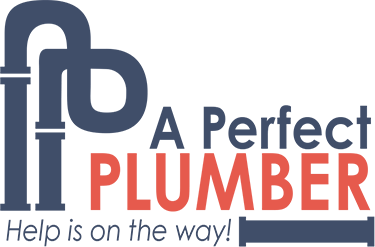Water Filtration
Your water likely has contaminants, but the good news is, it’s treatable.
Protect your family and home with a water filtration solution customized to your needs. Depending on your preferences and your water source, our water filtration technicians will identify and install the ideal water filtration system, including top brands like Aquasana and Halo. We also install many different brands of water softeners.
What cost-related factors should you consider for a water filtration system?
- Whole-home vs. point-of-use: A single point-of-use water filter is less expensive than a whole-home water filtration system.
- Water filter capabilities: A water filter model that both conditions and purifies the water will cost more than a model that only does one or the other.
- Location of the installation: The distance from the water main will determine the amount of piping needed.
- The choice of a salt-based water softener or a carbon-based filtration system: Installing a salt-based softener requires bypassing the hose bibs (outdoor spigots), which will increase costs.
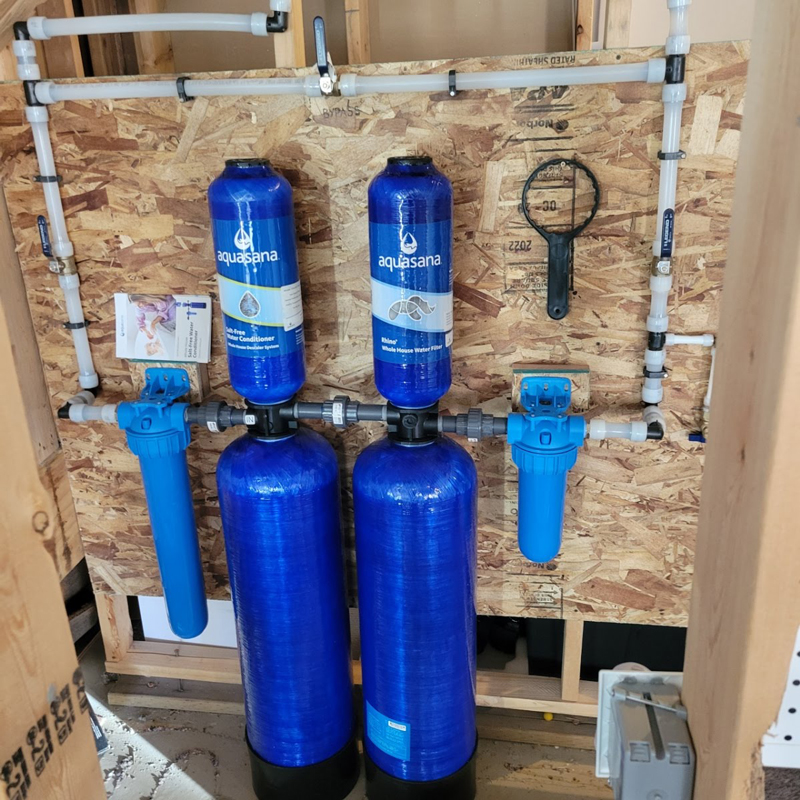
Not sure which system you need? Here’s more information about your options and how each can improve your in-home water quality.
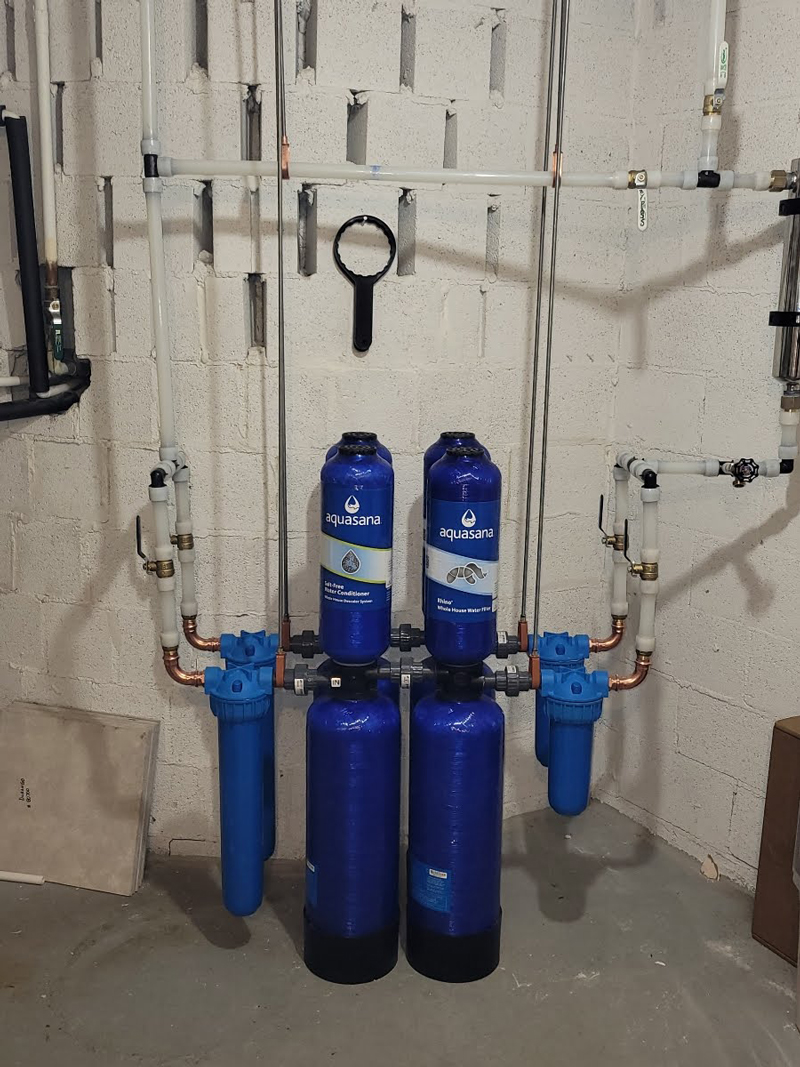
Aquasana:
- Aquasana Rhino (whole-house water filtration) - High-performance water filtration system that reduces 97% of chlorine and more from every tap in your home for 1,000,000 gallons or 10 years.
- Aquasana RhinoMax (whole-house water filtration) - Maximum-flow whole house water filtration system that reduces 97% of chlorine at 2 times the flow rate for 1,000,000 gallons or 10 years.
- Aquasana OptimH2O Reverse Osmosis + Claryum Systems (point-of-use under-the-counter filter system) - Combines Claryum® and reverse osmosis technology to remove 89 contaminants, including fluoride and arsenic.
- Aquasana Claryum 2-Stage System (point-of-use under-the-counter filter system) - Reduces 78 contaminants and transforms ordinary tap water into clean water.
- Aquasana Claryum 3-Stage System (point-of-use under-the-counter filter system) - Provides immediate access to clean, healthy water. Reduces 78 contaminants and includes a pre-filter to remove sediment and rust.
- Aquasana Claryum 3-Stage Max Flow System (point-of-use under-the-counter filter system) - Removes up to 99% of 78 contaminants plus sediment. Now available with 44% faster water flow for ultimate hydration.
Halo:
- Halo 5 (maintenance-free whole-house water filtration and conditioning system)
- Halo Ion 6 (inhibits limescale and removes existing scale without chemicals) - Uses multi-reversing polarity permanent magnetic fields to affect the “ionic charge identity” of the CaCo3 and MgCo3 so they remain suspended in the water rather than precipitate out as hard water scale.
- Halo Heater Guardian (protects water heaters by removing silt, dirt, rust and sediment) - Water passes through the high-capacity filter and the scale inhibitor chamber to prevent minerals from adhering to water heaters, fixtures and appliances.
- Halo Mini 2 (Two stage whole-house water filtration) - With a 5 micron sediment cartridge first stage and a premium UltraFlow carbon cartridge as a second stage; crystal clear great tasting water throughout your home is finally within reach.
- Halo Mini 3 (Three stage whole-house water filtration and conditioning system) - With the same first two stages as the Halo Mini 2, this system will also condition your water in its third stage. The conditioned water helps prevent corrosion due to scale and will dissolve existing scale over time.
- Halo RO5 (Five stage reverse osmosis purification system plus pH balancer) - This RO system addresses specific contaminants in your municipal or well water.
- H2 Zero (Go Green with maintenance-free whole-house water filtration and conditioning system) - Zero electricity, Zero backwash, Zero maintenance.
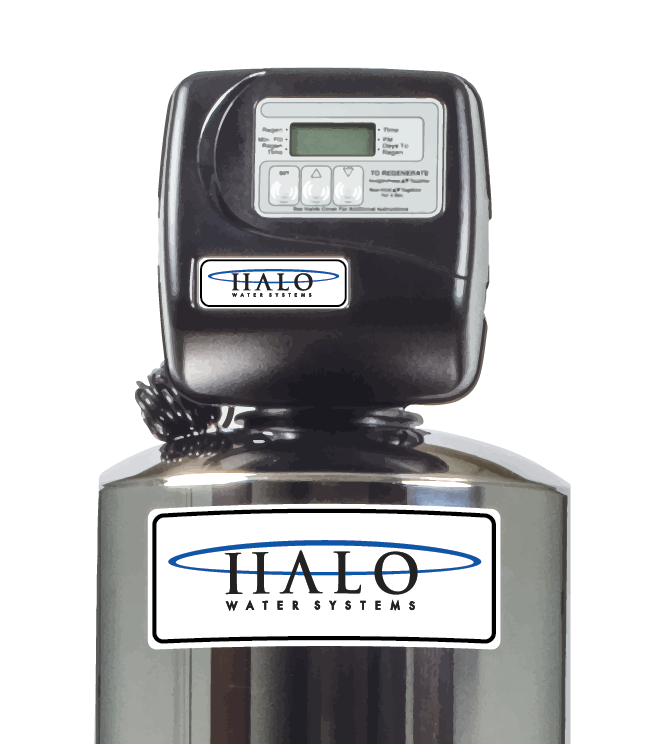
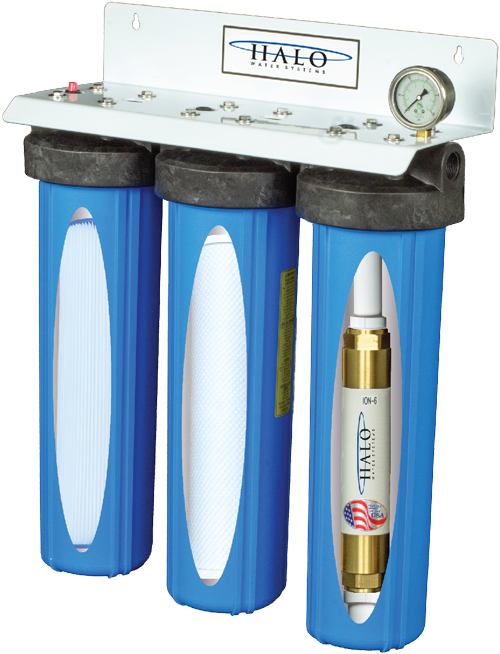
FAQ
What is Hard Water?
Hard water is calcium and magnesium that is dissolved in the water. It is absorbed as water travels in streams and through the ground on its way to its source. Calcium is mainly responsible for all the hard water problems that need to be treated. It is classified as temporary hardness.Read More Magnesium is permanent hardness and is rarely an issue. Water hardness is responsible for some types of water spotting, scale build up and can play havoc with soaps and detergents. Extreme hard water can make water undesirable to drink and can be harmful to humans and animals. Hardness is measured in grains per gallon (gpg). A simple way to describe this measurement is to take an aspirin tablet, it is 5 grains. If water is 20 grains hard, that would be the equivalent to 4 aspirin tablets of calcium and magnesium dissolved in one gallon of water. Water Hardness can be effectively treated with Water Conditioners and Water Softeners depending on the desired results.Read Less
What is Reverse Osmosis?
Reverse Osmosis commonly referred to as R.O. is used to remove solids and impurities from water. It is done through membrane technology and can be enhanced with carbon water filtration if used for drinking water purposes. In reverse osmosis, water is typically pre-treated for Read More heavy sediment removal, scale prevention and chlorine removal. This will extend the life of the membrane which is the heart of the system. Pre-treated water enters the membrane capsule. Water pressure (called osmotic pressure in technical terms) forces the water against the membrane. Any molecule that is the size of a water molecule or smaller will pass through the membrane, (permeate or product water) anything larger is retained on the back side of the membrane (concentrate or reject water). Because the product water is produced at a much slower rate than the flow required, the water is sent to a storage system. It will remain there until the water is demanded from the consumer. The rejected water and its impurities are sent to the drain or are used for other purposes where quality water is not needed. When product water is desired, it is pumped or pressurized by hydro pneumatic tanks to its source. Many reverse osmosis systems will provide additional carbon water filtration at this point to “polish the water” just before it reaches its final destination. Reverse Osmosis is effective in the removal of impurities and minerals and can be used in most cases where distilled water is required.Read Less
What is Soft Water?
Soft water is water that has never been exposed to calcium or magnesium or these elements have been removed through a process that replaces calcium or magnesium with sodium chloride (table salt). The term softened water reflects the hardness minerals have been exchanged Read More through a mechanical process called a water softener.Read Less
What is a Whole House Water Treatment System?
Whole House Water Systems typically treat water to make it more palatable (easy to drink) and cleaner for the entire home. These systems are installed at the main water line so every fixture in the home will have treated water. Depending on the claims from the manufacturer, Whole House Read More Water Treatment Systems can include, Water Conditioners, Reverse Osmosis, Filtration and Ultra Violet Disinfection. Water Softeners are not classified as a Whole House Filtration System because they have a single task of softening the water and many people do not find softened water favorable to drink because of the added sodium and taste.Read Less
What is Ultraviolet disinfection?
Ultraviolet disinfection is one of nature’s ways of sterilizing. It can easily be reproduced by mankind through ultraviolet lamps. One of the most common uses of ultraviolet sterilization is the disinfection of domestic water supplies. Water to be sterilized enters into a chamber Read More with ultraviolet lighting present. As the water flows through the U.V. chamber, the ultraviolet rays penetrate the organism. It causes a molecular rearrangement of the DNA and prevents it from reproducing. If the cell cannot reproduce, the organism is considered dead. The advantage of U.Vs is there are no chemicals such as chlorine used to disinfect the water supply, making the water supply safe and healthy for the consumer. Water treatment specialists will typically use U.V to treat the water as a final step just before it reaches the point of use because it does not affect the taste of the water. U.V is effective with a 99.99% kill rate and is used in air and water purification, sewage treatment, food and beverage protection. It will lose its strength and effectiveness over a period of time. Service and bulb replacement is required to assure the best protection that U.V can provide.Read Less
How does carbon filtration work?
Activated Carbon, Carbon Filtration is an inexpensive and effective way to remove organics and improve the overall aesthetics of the water. There are three grades of carbon: Coal based, Lignite (wood), and Coconut Shell. The surface of carbon has a natural tendency to attract organics Read More such as insecticides, pesticides, oil and gasoline. Municipal water supplies are commonly disinfected with chlorine and chloramines. Carbon provides an economic and impressive way to eliminate them. Coconut shell is the most common type of carbon used in the water treatment industry. Whole house water systems, reverse osmosis, and simple water filtration devices depend on carbon pre-treatment or final treatment, depending on the application.Read Less
Is there a different system that you’ve researched and would like installed in your home? We are happy to work with any brand of water filtration or water softener you choose.
